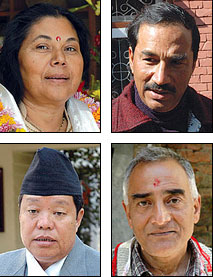 The dramatic announcement on Wednesday evening of a reshuffle in the council of ministers was a lot of sound and fury, but doesn't seem to signify much.
The dramatic announcement on Wednesday evening of a reshuffle in the council of ministers was a lot of sound and fury, but doesn't seem to signify much. The cabinet was expanded from 24 to 36. Some incumbents were sacked, others were kicked upstairs, few were moved sideways, fresh faces were brought in. But the fourth royal cabinet after February First is still a status quo government and proves King Gyanendra is determined not to deviate from his three-year-old roadmap just because the parties and the rebels have got together against him.
By now, the king has tried just about everything: from the technocrat-filled Chand cabinet in 2002, the Surya Bahadur Thapa cabinet, to the NC-D UML coalition. What is striking about the new faces this time is that five of the 12 new ministers are heads of their own showcase parties mostly set up recently.
Keshar Bahadur Bista who formed his own Prajatantrik Nepal party last month is on board with the agriculture portfolio. Durga Pokhrel who launched her own Nepali Congress-Rastrabadi with Prakash Koirala, and Salim Miyan Ansari of the Samajbadi Party are also ministers. Narayan Singh Pun, the architect of the 2002 ceasefire and head of the Samata Party, is back this time as Minister of Land Reform.
 By wooing off six central committee members from the RPP, including Kamal Thapa as Home Minister, the king has snubbed Pashupati SJB Rana who has been critical of the February First move. The king even got Buddhiman Tamang to defect from Surya Bahadur Thapa's RJP. Royalist journalist Shirish Rana is State Minister for Information and Communication.
By wooing off six central committee members from the RPP, including Kamal Thapa as Home Minister, the king has snubbed Pashupati SJB Rana who has been critical of the February First move. The king even got Buddhiman Tamang to defect from Surya Bahadur Thapa's RJP. Royalist journalist Shirish Rana is State Minister for Information and Communication. Analysts say the new cabinet is unlikely to help mend relations between the palace and the mainstream parties. There are also doubts about whether the new team can improve service delivery, governance, find a resolution to the conflict, or mend strained relations with international partners.
Some donors may be happy about the departure of Madhukar Rana from the Finance Ministry (Roop Jyoti has been promoted to his post) and the exit of Jagat Gauchan and Senate Shrestha may launder the government's image abroad, but it is unlikely that the new lineup will convince donors to unfreeze grants and loans suspended after 1 February. The reshuffle is mainly a show of defiance against a critical international community.
However, the timing of the reshuffle three days before the visit here of Indian Foreign Secretary Shyam Saran has raised speculation that there is more than meets the eye. King Gyanendra could be trying to drive a bargain with the Indians for support in exchange for geopolitical concessions.


